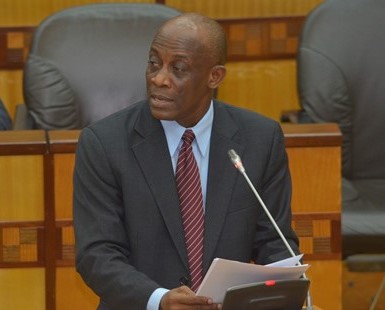Former Finance Minister Seth Terkper has demanded that the government presents accurate and transparent data about the economy’s true situation – especially with respect to the deficit figures as it prepares to present the mid-year budget this week.
His comments come on the back of concerns raised by the minority in parliament, that government has been presenting the true state of the economy to the international community but presents a different set of data that white-washes the economy’s situation to Ghanaians.
And again, with the coming of coronavirus which has thrown all budgets of governments around the world off-gear, Mr. Terkper says it is important that any exceptional expenditure made in reference to the pandemic be disclosed to the people for proper accountability.
“We have been pointing out in the past that the deficit figures which government was giving us was actually far lower. So, I am saying it would be good for the government to come and explain why its figures are different from what it gives the IMF.
“There are adjustments which the IMF and other institutions have made that clarify our numbers. So if we are going to incur more exceptional expenditure, whereby the debt is going to be higher than the deficit that we are disclosing, let’s not show it in the footnote or appendix; let us disclose it. Nobody is saying that we shouldn’t incur additional expenditure. What we are saying is that once that expenditure is made, it must be shown,” he said at a press conference in Accra last Friday.
Finance Minister, Ken Ofori-Atta, indicated in April that the estimated fiscal impact from the shortfall in petroleum receipts, shortfall of import duties, the shortfall in other tax revenues, the cost of the preparedness plan and cost of the Coronavirus Alleviation Programme is GH¢9.5billion, representing 2.5 percent of revised GDP.
However, the former Finance Minister said the government must also come clean on what the extra funds accrued from monies borrowed in the name of the pandemic have been or will be used for – as the borrowed funds have now exceeded the amount needed to close the fiscal gap created by the impact of the pandemic.
“The figure that was disclosed to parliament was GH¢9.5billion. And I am saying if you take the US$1billion from the IMF at an exchange rate of GH¢5.5, that is GH¢5.5billion. If you take the Stabilisation Fund of US$250million and you add the World Bank’s loan and other revenues that have come in for COVID, they amount to more than GH¢10billion. So, the cost has been covered for COVID-19; and so we should know where the additional borrowing is going to,” he said.
Besides the loans from the IMF and World Bank, the government has established a COVID-19 Fund to receive contributions and donations from the public to support the Coronavirus Alleviation Programme, and to assist in the welfare of needy and the vulnerable citizens.
It has also realigned the Statutory Funds toward expenditures that tend to mitigate impacts of the coronavirus pandemic (sanitation and health-related expenditures), and limited the award of new contracts while focusing on the payment of arrears. And again, the Bank of Ghana has tabled GH¢10billion to support the government’s budget for the year.
Mr. Terkper believes that with all these measures taken by the government and its agencies, it is in the best interest of accountability and transparency that whatever is disclosed to the international community be the same as disclosed to Ghanaians, whose mandate the government of the day seeks.










